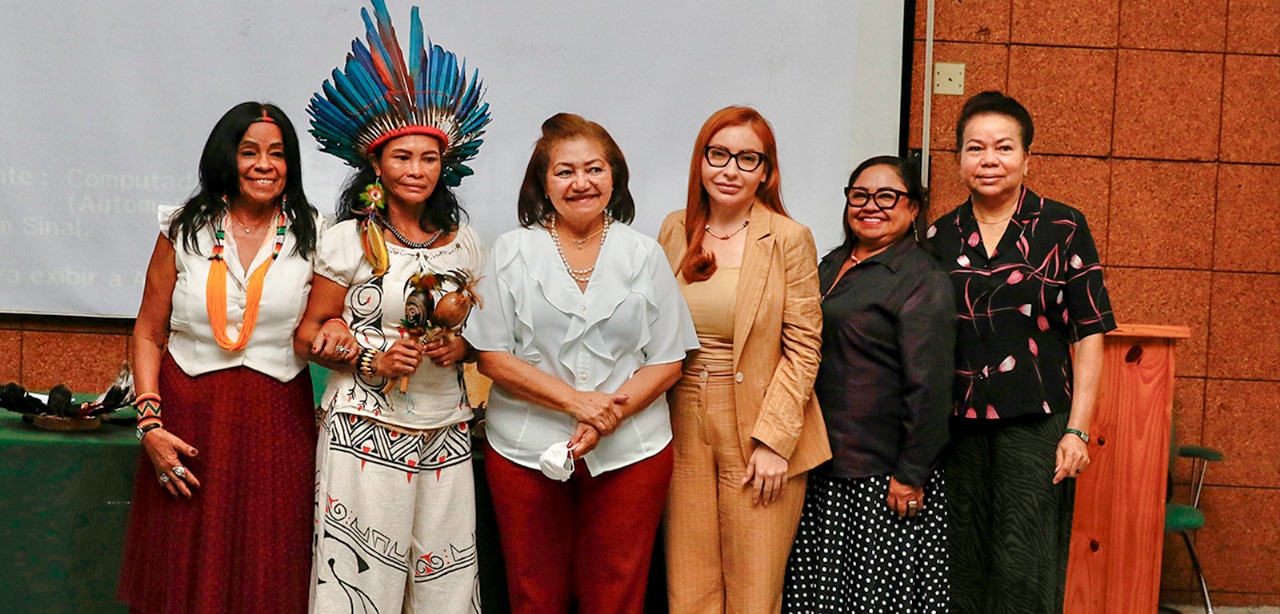Master’s thesis explores the fight for female power in the most Indigenous neighborhood of Manaus
05 de June de 2025

By Ana Pastana – From Cenarium
MANAUS (AM) – With the theme “The fight for the conquest of female power in Parque das Tribos: the body of the indigenous woman as a territory of resistance,” journalist and general director of CENARIUM, Paula Litaiff, defended her master’s thesis in the Graduate Program in Society and Culture of the Amazon (PPGSCA) at the Federal University of Amazonas (Ufam), and had her research approved.
Present on the examining board were professors Iraildes Caldas Torres, Ivânia Maria Carneiro Vieira, and Marilene Corrêa da Silva Freitas. The defense took place on Tuesday, the 3rd, in the Rio Negro auditorium of the Institute of Philosophy, Human and Social Sciences (IFCHS) at Ufam.

The thesis addresses the struggle of Kokama indigenous women, specifically the female leaders in Parque das Tribos, the largest urban indigenous territory in Manaus, located in the Central-West Zone of the Amazonian capital. The subject brings to academia a previously unexplored and socially relevant theme, as pointed out by Professor Dr. Iraildes Caldas Torres.
“The theme is very original; there is still no work here in academia on Kokama women. So, what really caught my attention in the work is the political engagement. Besides being an academic work, with all the rigor academia requires, it also has this strong political engagement profile,” said Iraildes.

The research investigates how indigenous female leaders of Parque das Tribos, especially the general chief Lutana Kokama, founder of the neighborhood along with chief Messias Kokama, who died in 2020 after contracting the Covid-19 virus, build processes of resistance in the face of multiple forms of symbolic, political, and gender-based violence, both locally and in relations with society and public authorities.
The general chief was present during the defense and became emotional at various moments. Lutana stated that, throughout the presentation, a film played in her mind, recalling the struggle, history, and achievements that she, as an indigenous leader of Parque das Tribos, helped to secure.
“I am emotional because we are telling a story that people didn’t have visibility of, and today it is being presented at the university. So, from invisibility to visibility, today I am very happy with this presentation, with this story, which is not a comic book story, but a real story. I was very moved because a movie passed through my mind of the entire struggle of Parque das Tribos,” declared general chief Lutana Kokama.

During the thesis presentation, Paula showed a documentary video in which she addressed the voices and moments shared with indigenous leaders during the research conducted in Parque das Tribos from 2022 to 2025. In the footage, the researcher highlighted, as an example, one of the various acts of violence suffered by general chief Lutana.
“This symbolic violence is not only internal to Parque das Tribos but is also revealed in the urban context outside the community, as demonstrated by Lutana’s accounts of the episode where she had to be completely naked to ‘prove’ to court officials and police officers that she was indigenous, pointing to an intersection of gender and racial oppression,” said Litaiff.

In turn, the general chief commented on what happened at the time, with the aggressive approach by court officials toward her and other indigenous people who accompanied her. “They claimed there were no indigenous people, none within society, in a noble area, right, because to them ‘Indian’ meant someone who lived in the village and walked around naked,” Lutana recounted in the documentary shown during the presentation.
Guest
The indigenous writer and professor Eliane Potiguara, who came to Manaus to attend Paula Litaiff’s master’s defense, reinforced the importance of addressing the struggle of indigenous women. “The importance of the theme is clear because when we talk about the indigenous woman, above all, we are bringing up a repressed situation, an oppressive situation. We make visible a situation that we’ve endured for so long,” she said.

The indigenous leader of the Mura people and resident of the indigenous community, artisan Maira Mura, stated that the topic goes beyond a master’s presentation. For her, the subject also has the potential to bring significant changes and visibility to the women of Parque das Tribos, who are still forgotten.
“I am very happy to contribute because this, for us, also means a denunciation, which I believe will reach the authorities, and we will be looked at more attentively. We women, who are leaders, can also be there, at the forefront of our work, speaking about our culture,” she stated.

